|
View of the Congo River at Matadi
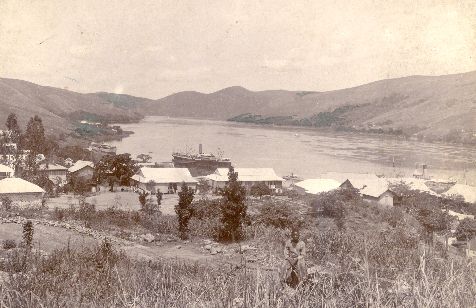
Well, here we are at last You will remember that we left Tampa on the 7th of August 1892. A little manual calculation will show that we have been en route for nearly ten months or to be more accurate nine months and seventeen days, as we reached Luebo on the 24th of May. About four months of this time was lost through waiting for the steamers & carriers were we to make the trip again I feel confident I could so order it as to make the trip in four months or in five months at the farthest unless an unusual delay occurred on the caravan route up to Leopoldville and so as to make no break in the history I will give you an account of our trip of 24 days up the Kassai.
Bright and early Monday morning may the 1st we boarded the tugboat Baron Weber, at Dr. Simms landing on the Congo river, (Our Chop & baggage had preceded up the week before about 130 loads between us. A load means a box weighing not over 80 lbs). The tug boat was a small affair and we were glad that our whole trip was not to be made on her. Our real starting point was to be from Kinchessa whence the tug was taking us on this afore said night.
May morning: Now in our early days. May meant the bursting forth of nature from her winter imprisonment. The beautiful grebe buds in the trees, the flowers in the field , the new grass, the singing of the birds in the woods, and added to their changing panorama of nature the Moving day when the people moved from one house in one part of the city to another house in another part of the city etc. etc. - And in our later days in Tampa, May was associated with the coming of summer and the dull season. When the tourist tried himself home and we settled back to grits and sweet potatoes, etc. but this May day was not like either of those pictures. Time we were moving and it looked as if we might fare worse than if we had the historical Grits and sweet potatoes . With us, summer had gone and we were entering the fall months and the thermometer stood at about 85* for not with standing the heat and small accommodations the three hours to Kinchessa passed away and after a short delay we were transferred to the steamer Archduchess Stephanie ; which steamer be it here Kuirore is but a little longer than her name and not much broader. We were met by Major Parminter of the English Army, who as the director of the Belgian Company was to be our fellow passenger.
Once on board we learned that the steamer would not sail until late in the afternoon. The major invited us to take dinner with him and there we met another of the passengers An American from N.Y. City, A Mr. Vincent, a great traveler and who was on this trip merely to see the country and to enable him to say he had traveled on the Congo , Mr. Vincent we found to be one of those typical American whom one is sure to find wherever one goes quick at repartee, witty and of course genuine. The Major too is a man who can see is well as make, a joke and our trip promised to be enjoyable and interesting and so it proved
The other passengers were Belgians who can speak but little if any English In all there were fourteen white people, not including the captain & engineer and only four cabins The Captain occupied one cabin the Engineer one, Major Parminter one so you see the accommodations for the remaining thirteen passengers when we had a crew of 100 natives You will wonder why such a large crew were needed for so small a streamer; A little explanation, however, will make it plain. The streamer burns wood, plenty of it, every night enough wood had to be cut to last the steamer the following day every afternoon at five o?clock the steamer is supposed to tie up at some wooded bank and the crew are sent off to find dry wood & cut it, cord it, and bring it on board by six o?clock the following morning. I say supposed, for more often the boat lands at six o?clock at night when it is fairly dark and the men find it rather difficult to obtain the required amount and the next morning the boat is delayed and a dozen or more of the men flogged - We had more than once to listen to the cries of the men as the lash descended . We are against such treatment of hired men and fail to see the good results accruing from it, others, even missionaries think differently. We will never forget out first night, it was after seven o?clock when we tied up to one of the banks of the Congo. The wildness of the place, the weird appearance as the men passes into the woods with their torches
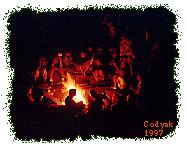 The camp fires on the beach, the yelling of the men as they called one to the other and the fact that we were many miles from any white people. All tended to our impression on our minds which will remain when other pictures have faded away. The natives of whom the crew consists are Bengali tribe Men who seemly have no fereing. One day they were seen to pick a chicken alive another time to waste a dog alive such sights almost discourage missionary work until the better thought comes. How much more they need the missionary.
The camp fires on the beach, the yelling of the men as they called one to the other and the fact that we were many miles from any white people. All tended to our impression on our minds which will remain when other pictures have faded away. The natives of whom the crew consists are Bengali tribe Men who seemly have no fereing. One day they were seen to pick a chicken alive another time to waste a dog alive such sights almost discourage missionary work until the better thought comes. How much more they need the missionary.
The third day out we leave the now historical Congo and enter the Kassai, which river is almost as large as the Congo and certainly just as swift. A current that travels at the rate of five miles and hour, which means hard work for a steamer. The channel is constantly shifting and new sand bars forming and this makes hard work for the Captain, but the engines are powerful and the Captain quick of eye. And every day we go farther and farther away from home and loved ones. The scenery, along the rivers, is grand beyond description, banks rise up on either side from two to fore hundred feet, covered with forest of Mahogany, Acacia, Palm and red wood trees while in between the rubber vine and other creeping peanuts entwine themselves until the hills seem in accessible because of the impenetrability of the wooded growth. Sometimes the tops of the trees seem ton fire because of the bright red blossoms seen Again they seem decked with snow as the white blossoms of some cries start out as if to say. Notice me. Again one sees in quick succession a bright light green a dark green and a darker green, then brown then a bright yellow till the eye grow confused with natures rapid changes. But then again one sees the same panoramic day after day - day after day until it becomes monotonous. One has other things to see, however, other than in, Animated Nature.
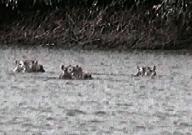 The major had promised us a sight of hundreds of hippopotami the forth day out, and we has said Yes, with an upward inflection which meant that we thought he was exaggerating, but we did see more then two hundred and that certainly means hundreds, most of them showed us only their noses and ears, but we saw some partly out of the water and a few entirely out, great ungainly creatures! Great gapers they are too, and when they gape we can readily understand how easily the can crush to atoms a row boat or canoe. For as of Hippo?s there was a singular death on the Congo the other day , A white man went out in a canoe to shoot a hippo he succeeded in wounding one and stood ready gun in hand to give it a final shot when it came up. But the Hippo came up under the canoe and Mr. Man went up in the air and landed in the water some yards away from the boat and was drowned.
The major had promised us a sight of hundreds of hippopotami the forth day out, and we has said Yes, with an upward inflection which meant that we thought he was exaggerating, but we did see more then two hundred and that certainly means hundreds, most of them showed us only their noses and ears, but we saw some partly out of the water and a few entirely out, great ungainly creatures! Great gapers they are too, and when they gape we can readily understand how easily the can crush to atoms a row boat or canoe. For as of Hippo?s there was a singular death on the Congo the other day , A white man went out in a canoe to shoot a hippo he succeeded in wounding one and stood ready gun in hand to give it a final shot when it came up. But the Hippo came up under the canoe and Mr. Man went up in the air and landed in the water some yards away from the boat and was drowned.
 There we saw crocodiles of a bright yellow color some ten to fifteen feet long and large in proportion
Again we saw snakes swimming on top of the water. Here to fore all snakes we have seen swimming showed only their heads above the water. These lay their whole length exposed.
There we saw crocodiles of a bright yellow color some ten to fifteen feet long and large in proportion
Again we saw snakes swimming on top of the water. Here to fore all snakes we have seen swimming showed only their heads above the water. These lay their whole length exposed.
Parrots flew over us daily in flocks of from ten to thirty. Pelicans and storks were to be seen frequently. The white headed and white tipped winged eagle attracted our gaze and called forth our admiration time and time again as it gracefully soured above
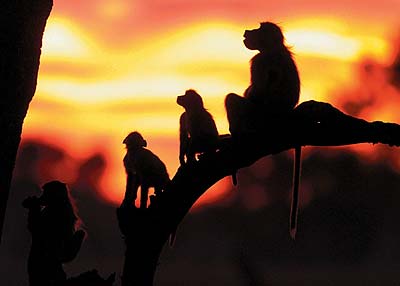 Then the Monkeys; days went by before we were granted a sight of them. One night as we neared the shore a great commotion was noticed among the trees.
As the boat drew nearer we swathe cause of the agitation among the boughs for springing right and left, from limb to limb were monkeys galore. Some small,
some large, the larger were black haired and handsome as monkeys go. Elephants we did not see, they kept away from the banks. It was one disappointment.
Ivory we saw but the proud animal that bears it kept himself aloof. The natives on board have a hard time of it, cutting wood after dark in immense forest
is unhandy to say the least and not unattended with danger. One night, about midnight, Major Parminter came to me awaking me asked if I had anything with
me good for snake bites: - Immediately I answered , Yes, and arose. Some years ago I read in a paper a sure cure for snake bites and proceeded to copy it
down in a note book. While so doing a friend of mine seeing what I was taking note of remarked "I saw that too but what is the use of taking as note of it."
If you should ever be bitten by a snake, you are sure to not have the hypodermic syringe with you nor the permanganate of potash.
That night as Major Parminter awoke me from (**???**) sleep, the remedy for "Snake bite" came to me like a flash and I had both the syringe and the medicine with me.
I followed him and finding the man suffering severe pain in the whole length of his arm. I gave the injection of one gram of permanganate potash into the wound
giving instant relief and although there was some doubt as to whether it was a sake or a centipede which had done the injury, the permanganate evidently countered
the poison and as far as a remedy went it was a success and I can recommend it. Dissolve one gram of permanganate of potash in ten or twenty minutes of water and
inject immediately into the wound caused by the bite Synopsis of the Centipede I have seen them here six inches long and a bite by them is considered dangerous
if not deadly. Another night one of the natives got entangled in an elephant trap and had two bad wounds in his leg which I dresses for him. It was a wonder
that the trap did not kill him on the spot. The natives set the trap, two tall posts standing opposite each other support a large weighted spear, a rope attached
to the spear is carried down one of the posts and then across the way by which an elephant is supposed to go, where the elephants feet touch the ropes in some way,
it loosens the spears and down the spears come into the back of the beast. So you can see how narrow an escape the native had when in the darkness of night he ran
afoul of such a trap.
Then the Monkeys; days went by before we were granted a sight of them. One night as we neared the shore a great commotion was noticed among the trees.
As the boat drew nearer we swathe cause of the agitation among the boughs for springing right and left, from limb to limb were monkeys galore. Some small,
some large, the larger were black haired and handsome as monkeys go. Elephants we did not see, they kept away from the banks. It was one disappointment.
Ivory we saw but the proud animal that bears it kept himself aloof. The natives on board have a hard time of it, cutting wood after dark in immense forest
is unhandy to say the least and not unattended with danger. One night, about midnight, Major Parminter came to me awaking me asked if I had anything with
me good for snake bites: - Immediately I answered , Yes, and arose. Some years ago I read in a paper a sure cure for snake bites and proceeded to copy it
down in a note book. While so doing a friend of mine seeing what I was taking note of remarked "I saw that too but what is the use of taking as note of it."
If you should ever be bitten by a snake, you are sure to not have the hypodermic syringe with you nor the permanganate of potash.
That night as Major Parminter awoke me from (**???**) sleep, the remedy for "Snake bite" came to me like a flash and I had both the syringe and the medicine with me.
I followed him and finding the man suffering severe pain in the whole length of his arm. I gave the injection of one gram of permanganate potash into the wound
giving instant relief and although there was some doubt as to whether it was a sake or a centipede which had done the injury, the permanganate evidently countered
the poison and as far as a remedy went it was a success and I can recommend it. Dissolve one gram of permanganate of potash in ten or twenty minutes of water and
inject immediately into the wound caused by the bite Synopsis of the Centipede I have seen them here six inches long and a bite by them is considered dangerous
if not deadly. Another night one of the natives got entangled in an elephant trap and had two bad wounds in his leg which I dresses for him. It was a wonder
that the trap did not kill him on the spot. The natives set the trap, two tall posts standing opposite each other support a large weighted spear, a rope attached
to the spear is carried down one of the posts and then across the way by which an elephant is supposed to go, where the elephants feet touch the ropes in some way,
it loosens the spears and down the spears come into the back of the beast. So you can see how narrow an escape the native had when in the darkness of night he ran
afoul of such a trap.
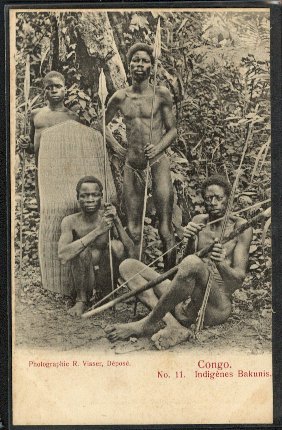 At one village, on the banks of the Kassai, Major Parminter delayed the boat for five days to enable the building of a house for two of his agents, in other words,
to establish a trading station, The natives at this village seemed friendly, although they were cannibals by nature.
They were ready to sell their bows and arrows for a hand full of beads, we purchased several as curious and if our lives were spared. You will see them sometime
at the Presbyterian Church. Mrs. S. and myself took a walk by the village back from the river to see the natives, when we reached the village a native met us and
insisted upon our going to see his hut some distance away. We could not understand what he said but were made to understand what he wanted by his actions for
getting behind us and he pushed us along. We did not exactly like it but thought it best to go on. When we reached his hut he introduced us to his wife and then
led us to another native woman who was crying bitterly. We did not know what to make of it, but tried to sympathize with her and were wondering what would be the
out come of it all; when a noise of loud calling attracted our attention to the sight - And we saw coming down along the path a native brandishing a knife and
calling out Mundila, Mundila, (White man, White man) and then passing the knife across his throat in a very suggestive manner. Soon they, the natives, came running
from all directions and such a noise as each one tried to make himself or herself heard. Mrs. S. & I started for the boat, I did not know what to think of it nor
what it all meant, but of one thing I was sure and that was that it was best for us to get to the boat. After it was all over and the excitement cooled down we
learned that (one of our men, a Bengali, had stolen a goat from the natives and was about to cut its throat. And the excitement (and the natives are very excitable)
was caused by the theft and attempt at killing. The native who came running to us with his knife was merrily trying to tell us of the occurrence.
At one village, on the banks of the Kassai, Major Parminter delayed the boat for five days to enable the building of a house for two of his agents, in other words,
to establish a trading station, The natives at this village seemed friendly, although they were cannibals by nature.
They were ready to sell their bows and arrows for a hand full of beads, we purchased several as curious and if our lives were spared. You will see them sometime
at the Presbyterian Church. Mrs. S. and myself took a walk by the village back from the river to see the natives, when we reached the village a native met us and
insisted upon our going to see his hut some distance away. We could not understand what he said but were made to understand what he wanted by his actions for
getting behind us and he pushed us along. We did not exactly like it but thought it best to go on. When we reached his hut he introduced us to his wife and then
led us to another native woman who was crying bitterly. We did not know what to make of it, but tried to sympathize with her and were wondering what would be the
out come of it all; when a noise of loud calling attracted our attention to the sight - And we saw coming down along the path a native brandishing a knife and
calling out Mundila, Mundila, (White man, White man) and then passing the knife across his throat in a very suggestive manner. Soon they, the natives, came running
from all directions and such a noise as each one tried to make himself or herself heard. Mrs. S. & I started for the boat, I did not know what to think of it nor
what it all meant, but of one thing I was sure and that was that it was best for us to get to the boat. After it was all over and the excitement cooled down we
learned that (one of our men, a Bengali, had stolen a goat from the natives and was about to cut its throat. And the excitement (and the natives are very excitable)
was caused by the theft and attempt at killing. The native who came running to us with his knife was merrily trying to tell us of the occurrence.
At this station we saw native men kiss each other when they met and for the first time saw the women kiss their babies, it showed that much civilization any way.
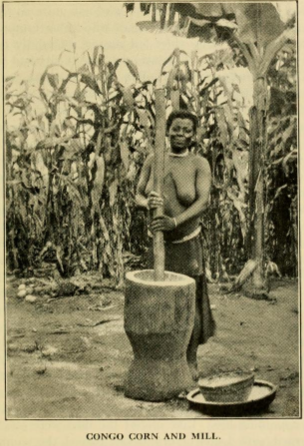 They raise plenty of bananas, peanuts, manioc, and corn here.
They grind the corn in a mortar made by hollowing out a block of wood, using as a pestle an ivory tusk from a young elephant. I succeeded in purchasing a pestle
which must have been used for over a hundred years as the prints of the finger, where the hand grasped the pestle when in use, are worn into the ivory to the depth
of a half inch, knowing the hardness of ivory, you can readily understand that it must have taken years to wear it away.
They raise plenty of bananas, peanuts, manioc, and corn here.
They grind the corn in a mortar made by hollowing out a block of wood, using as a pestle an ivory tusk from a young elephant. I succeeded in purchasing a pestle
which must have been used for over a hundred years as the prints of the finger, where the hand grasped the pestle when in use, are worn into the ivory to the depth
of a half inch, knowing the hardness of ivory, you can readily understand that it must have taken years to wear it away.
The native is more like a child in thought
and action, than a man. The smallest thing amuses and interests him and they will stand for hours watching the boat and the White people. They throw the head backwards and the chin out when making a motion of assent. Unlike the way we do, we bow the head forward. When they motion you to come near they do it with a forward and downward motion of hand and arm and not an upward and forward beckoning, instead of pointing with the finger they point with their lips.
One or two places along the river the natives were quite threatening waving us off and making motions as if they would let fly a shower of arrows.
The Captain of the sister boat to ours was shot through the neck with an arrow along this river only a year ago.
One village at which we meant to land the natives were so aggressive that the Captain changed his mind and we did not land.
At one village we saw poisoned arrows, but the longest voyage must have an end And we reached the mouth of the Luluo river on the 23rd of May.
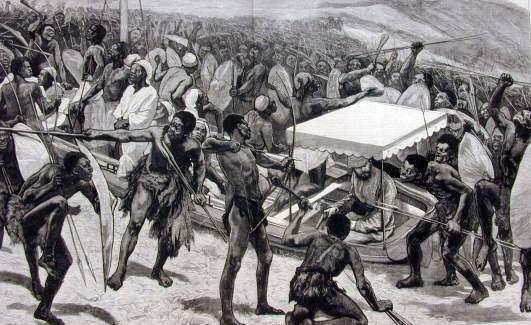 The Belgian Co. have a station here and as we drew near we saw plenty of black people but no white men and we shared the fear of Major Parminter
that something was wrong and so we found it.
For on landing we found the white agent sick with Haemeturic fever. It was the first case we had the opportunity of
treating and we tried the treatment of Dr. Simms and God blessed the means used. And before we left the next day the patient was able to sit up and the Haemeturie was cured, The treatment consists of a full dose of Caloniel & Jalape And then when the results are obtained a hypodermic injection of Hydro carbonate of quinine. Other than this, the treatment usual to all fever. Late the following night May 24, we reached Luebo, the end of our journey. And by noon the next day we were here at our station and by nightfall all our goods were at the station and our beds made up on the earth floor of a mud house thatched with grass. Glad that the traveling was done with. Glad to be in our field of labor. Thankful to God for his care and journeying mercies and believing that our trip from Tampa here so far from accident was due in a great measure to the prayers of the dear one so many thousands of mile away.
The Belgian Co. have a station here and as we drew near we saw plenty of black people but no white men and we shared the fear of Major Parminter
that something was wrong and so we found it.
For on landing we found the white agent sick with Haemeturic fever. It was the first case we had the opportunity of
treating and we tried the treatment of Dr. Simms and God blessed the means used. And before we left the next day the patient was able to sit up and the Haemeturie was cured, The treatment consists of a full dose of Caloniel & Jalape And then when the results are obtained a hypodermic injection of Hydro carbonate of quinine. Other than this, the treatment usual to all fever. Late the following night May 24, we reached Luebo, the end of our journey. And by noon the next day we were here at our station and by nightfall all our goods were at the station and our beds made up on the earth floor of a mud house thatched with grass. Glad that the traveling was done with. Glad to be in our field of labor. Thankful to God for his care and journeying mercies and believing that our trip from Tampa here so far from accident was due in a great measure to the prayers of the dear one so many thousands of mile away.
Of this place and of the natives I will write some other time. We found Mr. And Mrs. Adamson well not having had a fever for a year.
Pray God that we may be kept as free. I found my work awaiting me, not so much sickness among the natives as bad sores. Ulcers on Ulcers,
from the mild and easily managed to the phagedemic.
Last Sunday I spoke to the natives through an interpreter
Hoping to be able to write you a full description of this mission and the work in the near future . I remain
D. W. Snyder
|










